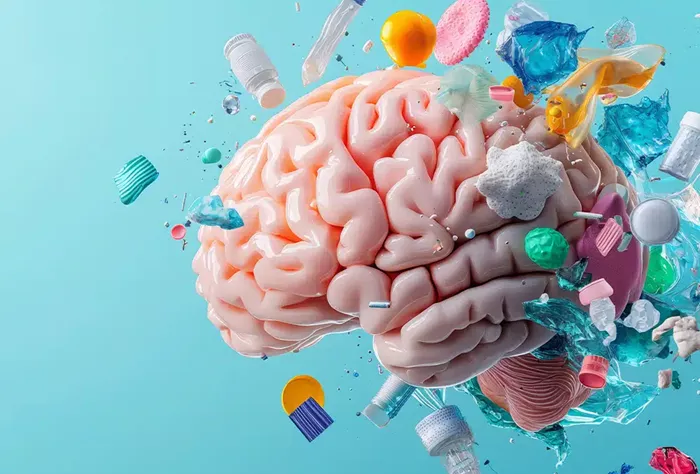A groundbreaking study has uncovered alarming levels of microplastics in the human brain, with concentrations far exceeding those found in other organs. The study, published in Nature Medicine, suggests that the brain may be uniquely vulnerable to the accumulation of microplastics, raising concerns about potential health risks.
Research has shown that the average person consumes between 78,000 and 211,000 microplastic particles annually through drinking water, food, and even the air we breathe. These microscopic particles, which can be harmful to human health, are typically byproducts of larger plastic items breaking down in the environment.
Previous studies have already linked microplastics to various health problems, including heart disease, lung disease, and cancer. However, this new research brings attention to a specific area of concern: the human brain.
For the study, researchers analyzed brain tissue samples donated post-mortem between 2016 and 2024. They discovered significantly higher concentrations of microplastics in the brain compared to other organs, such as the liver, kidneys, and placenta.
Dr. Matthew Campen, a toxicologist and lead author of the study, explained that the brain’s high metabolism and lipid-rich composition may make it particularly susceptible to microplastic accumulation. “This finding suggests that the brain may be uniquely vulnerable to microplastics,” he said, adding that while the discovery is concerning, it also provides hope that reducing exposure could prevent further accumulation.
One of the study’s most striking findings is the discovery that people diagnosed with dementia have up to 10 times more microplastics in their brains than those without the condition. However, researchers caution that while the concentrations are higher, it is still unclear whether microplastics contribute to dementia. Dr. Marcus Garcia, a toxicologist and co-author of the study, emphasized that more research is needed to understand the potential link between microplastics and neurological conditions.
“We don’t currently suggest that microplastics cause dementia, but we believe further research is crucial to determine whether changes in brain metabolism or other factors in dementia patients influence microplastic accumulation,” Garcia explained.
The researchers identified 12 different polymers in the brain tissue samples, with polyethylene being the most common. This widely used plastic is found in everyday products such as packaging, bags, and water pipes. The presence of polyethylene in the brain highlights the widespread nature of plastic contamination and raises questions about its long-term impact on health.
Experts are sounding the alarm about the rising levels of microplastics in the environment and human body. Dr. Jasmin Dao, a pediatric and adult neurologist, expressed concern over the study’s findings. “Microplastic and nanoplastic concentrations in the brain were found to be seven to 30 times higher than those in the kidneys and liver, which is alarming,” Dao said. “However, more studies are needed to fully understand the health implications.”
Dr. Kamal Wagle, an expert in memory loss and brain health, also emphasized the need for further investigation into the effects of microplastics on the brain and their possible connection to neurological diseases.
The study sheds light on the increasing presence of microplastics in the human brain, particularly in those with dementia. While the implications are still unclear, the findings highlight the importance of reducing microplastic exposure to protect public health. Researchers call for continued investigation to understand the full scope of microplastic risks and to develop strategies to mitigate potential harm.
Read more:
- Omega-3, Vitamin D, And Exercise May Slow Aging, Study Finds
- Eating One Egg A Week May Lower Heart Disease Death Risk, Study Shows
- Delayed Dreaming Could Be Linked To Alzheimer’S Disease, Study Reveals


